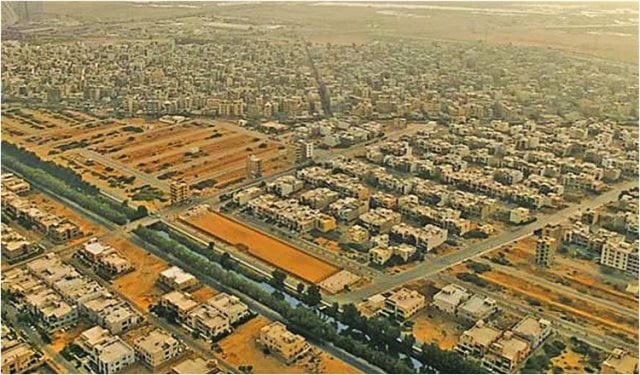
Dubai’s Real Estate Market experiences a remarkable resurgence in recent years, capturing global attention and prompting neighboring regions to reevaluate their Real estate trends in UAE. This revitalization is not merely a cyclical upturn but a testament to Dubai’s adaptive policies, strategic initiatives, and its appeal to a diverse international clientele. The ripple effects of Dubai’s success & Dubai real estate market trends are evident as neighboring cities and countries take note, aiming to emulate its achievements while tailoring strategies to their unique contexts.
The Resurgence of Dubai’s Property Market
Since February 2021, Best areas to buy property in Dubai’s property prices have surged by approximately 75%, nearing the record highs witnessed before the 2008 financial crisis. As of last week, the average property price reached Dh1,750 ($476.50) per square foot. There are few aspects of this development:
- Economic Resilience and Diversification: Dubai’s strategic move to diversify its economy beyond oil has fostered a robust environment for real estate. The emphasis on tourism, finance, and technology has attracted a global workforce, increasing demand for housing.
- Liberalized Visa Policies: The introduction of the Golden Visa program has incentivized long-term residency, particularly among investors and skilled professionals, thereby boosting property investments.
- Population Growth: Dubai’s population has risen to approximately 3.85 million, with expatriates comprising 87%. This demographic expansion has intensified the demand for housing, leading to a 16% increase in rents over the past year.
- High Rental Yields: The city offers attractive rental returns, appealing to expatriates and investors seeking lucrative opportunities.
These elements have collectively fueled a 50-month price rally, reflecting a sustained period of growth and stability in the property sector.
Strategic Developments and Future Outlook
To accommodate the burgeoning demand, Dubai is proactively expanding its housing inventory:
- Luxury Villas: The city is constructing nearly 9,000 villas by the end of this year, with plans for an additional 19,700 in 2025. Despite these efforts, a shortage of high-end properties persists, particularly in prime neighborhoods like Palm Jumeirah, where prices have escalated by 20%.
- Urban Planning: Anticipating a population of 5.8 million by 2040, Dubai estimates the need for 37,600 to 87,700 new homes to meet future demands. This foresight underscores the city’s commitment to sustainable growth and infrastructure development.
While the market’s momentum is strong, considerations about sustainability and potential challenges, such as global economic fluctuations, are pertinent. However, enhanced mortgage regulations and a diversified economy provide a buffer against possible downturns.
Neighboring Regions: Observing and Adapting
Dubai’s property market success has not gone unnoticed. Neighboring cities and countries are observing closely, adapting strategies to attract residents and investors:
- Abu Dhabi: The capital is emphasizing larger, family-friendly homes and cultural attractions to diversify its appeal. This approach aims to create a holistic living environment that caters to both locals and expatriates.
Information for Dubai Tourism
- Qatar: Post-World Cup, Qatar is leveraging its enhanced global profile to boost real estate investments, focusing on luxury developments and expatriate-friendly policies.
- Ras al-Khaimah: This emirate is positioning itself as a tranquil alternative to Dubai, promoting its natural landscapes and emerging tourism sector to attract both residents and investors.
- Bahrain: Focusing on urban regeneration, Bahrain aims to retain its historic areas while introducing modern infrastructure, blending tradition with contemporary living to enhance its real estate appeal.
Challenges and Considerations
Despite the thriving market, challenges persist:
- Living Costs vs. Salaries: The influx of expatriates has driven up living costs, with rents increasing by 16% over the past year. However, average salaries have remained stagnant, posing financial challenges for middle-income professionals.
- Market Sustainability: The rapid price appreciation raises concerns about the sustainability of such growth, especially given Dubai’s history of boom and bust cycles in real estate.
- Supply and Demand Balance: While new constructions are underway, aligning supply with the escalating demand, particularly in the luxury segment, remains a critical focus to prevent market overheating.
Conclusion
Dubai’s property market exemplifies a dynamic and resilient sector, driven by strategic initiatives, economic diversification, and an inclusive approach to global investors. The city’s ability to adapt and innovate serves as a blueprint for neighboring regions, inspiring tailored strategies that reflect local contexts and aspirations. As Dubai continues to evolve, its experiences offer valuable insights into sustainable urban development and the complexities of managing rapid growth in a globalized world.
References:
Read: reuters.com
Read: Financial Times
Dubai’s property market is thriving – and its neighbors are taking notes
Read: Financial Times:
Read: Business Insider
FAQs Source: Quora.com
Dubai real estate growth is going up and Is Dubai a country or a city?
Dubai is a city and an emirate in the United Arab Emirates (UAE). The UAE is a country consisting of seven emirates, including Dubai, Abu Dhabi, Sharjah, and others. While Dubai has a high degree of autonomy, it is not an independent country.
Is Dubai a good place for Luxury real estate in Dubai?
Yes, Dubai is an excellent place for real estate investment due to:
- High rental yields (around 5-8% annually, higher than many global cities).
- Zero property tax (making it attractive for foreign investors).
- Residency visa benefits (investors can get long-term visas based on property value).
- Booming demand (luxury real estate, waterfront properties, and villas are in high demand).
- Upcoming mega projects (Dubai Creek Harbour, Palm Jebel Ali, etc.).
However, investors should research market cycles and emerging areas before investing.
What is it like to live in Ras Al Khaimah a Middle East property market ?
Ras Al Khaimah (RAK) offers a quiet, relaxed lifestyle compared to Dubai or Abu Dhabi. Key features:
- Lower cost of living (affordable housing and utilities).
- Scenic landscapes (mountains, beaches, and desert areas).
- Expanding infrastructure (more schools, hospitals, and malls).
- Less traffic than Dubai and a slower pace of life.
- Growing tourism and investment (especially in hospitality and adventure tourism).
It’s ideal for those who prefer a peaceful environment with easy access to Dubai (about an hour’s drive).
Which is better: Abu Dhabi or Dubai?
It depends on your priorities:
- For business & nightlife: Dubai (more opportunities, global businesses, and entertainment).
- For family life & stability: Abu Dhabi (quieter, more green spaces, and structured development).
- For investment: Dubai (higher returns, more demand, and a larger expat market).
- For culture & heritage: Abu Dhabi (home to the Louvre Museum, Sheikh Zayed Mosque).
If you want a fast-paced, international city, choose Dubai. If you prefer a relaxed, structured lifestyle, Abu Dhabi is better.
Which are the luxury villas in Dubai and where?
Dubai has several luxury villa communities, including:
- Palm Jumeirah – Iconic beachfront villas with private beaches.
- Emirates Hills – Exclusive, gated community known as Dubai’s “Beverly Hills.”
- Dubai Hills Estate – Golf course villas with modern designs.
- Jumeirah Golf Estates – Villas overlooking golf courses, popular among expats.
- District One (Mohammed Bin Rashid City) – High-end villas with crystal lagoons.
How is the angel investment and venture capital scene for technology companies in Dubai (UAE)?
Dubai’s startup ecosystem is growing rapidly with strong government support:
- Dubai International Financial Centre (DIFC) and Abu Dhabi Global Market (ADGM) offer startup-friendly regulations.
- VC firms and angel investors like BECO Capital, Wamda, and Middle East Venture Partners actively invest.
- Government initiatives such as the Dubai Future Foundation and Hub71 in Abu Dhabi support tech startups.
- Sectors like fintech, AI, and blockchain are receiving increasing funding.
Dubai’s tax-free environment and access to Middle Eastern and African markets make it an attractive hub for startups and investors.
How is life in Dubai for Pakistanis?
Abbottabad Property portrays well on life in Dubai for Pakistanis is generally good and comfortable, with a large Pakistani community, diverse job opportunities, and a welcoming environment. Here are some key aspects of life in Dubai for Pakistanis:
1. Large Pakistani Community
- Dubai has a significant Pakistani population, estimated to be around 1.7 million in the UAE, with many living in Dubai and Sharjah.
- Areas like Al Nahda, Deira, Bur Dubai, and Al Qusais have a strong Pakistani presence, making it easy to find Pakistani restaurants, shops, and mosques.
2. Job Opportunities
- Many Pakistanis work in construction, retail, hospitality, finance, IT, and business sectors.
- Salaries vary, but skilled professionals (engineers, IT experts, bankers) earn competitive salaries.
- Business-friendly policies allow Pakistani entrepreneurs to set up companies in free zones or mainland Dubai.
3. Cost of Living
- Housing costs can be high, especially in central areas. Many Pakistanis prefer Sharjah (cheaper rents) and commute to Dubai.
- Groceries, transportation, and utilities are affordable, but school fees and healthcare can be expensive.
- Public transport (metro, buses, taxis) is efficient and widely used.
4. Lifestyle and Social Life
- Dubai offers a modern, safe, and cosmopolitan lifestyle with access to malls, beaches, parks, and events.
- Pakistani cultural events, cricket matches, and community gatherings happen frequently.
- Religious freedom allows easy access to mosques and Halal food.
5. Education and Healthcare
- Many Pakistani families send their children to Pakistani curriculum schools or British/Indian curriculum schools.
- Healthcare is world-class, with both public and private hospitals available.
6. Challenges
- Work-life balance can be tough due to long working hours.
- Extreme summers (up to 50°C) can be difficult for new arrivals.
- Job competition and sponsorship rules can sometimes be challenging.
Final Verdict
Dubai is a great place for Pakistanis due to job opportunities, safety, and a strong community presence. However, managing expenses and adjusting to Dubai’s fast-paced lifestyle are important factors to consider before moving.
Follow Abbottabad Property for the latest real estate updates.




Leave a Reply